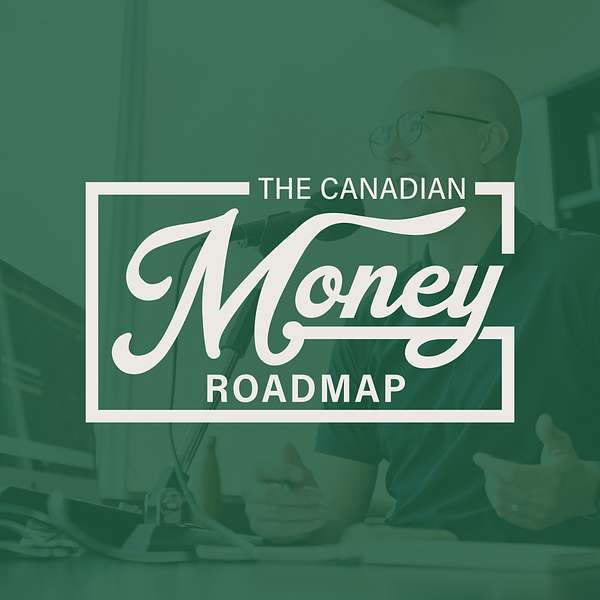
The Canadian Money Roadmap
Invest smarter, master your money, live & give more
The Canadian Money Roadmap
How to help your kids buy a home
EPISODE SUMMARY
In this episode, Evan talks about the things you would want to consider before helping your kids with a downpayment to buy a home.
✅ DOWNLOAD FREE RETIREMENT READINESS CHECKLIST
TOPICS IN THIS EPISODE
- Why this is a relevant discussion in 2022
- The oxygen mask principle
- From the parent perspective, could you help your kids?
- Should you help your kids?
- How do you help your kids
OTHER EPISODES
12. Buying a House Featuring Kindra Sowden
43. Should you Rent or Buy a Home
If you enjoy listening to the podcast, please leave a 5 star review on Apple Podcasts
🌳 Connect with Evan and Cedar Point Wealth | Services and Pricing
🗣️ I want to hear from you! Record your question here and you could be featured on an upcoming episode of the podcast
✨ Get your money organized - Your Full Financial Picture Spreadsheet
Hello, and welcome back to the Canadian Money Roadmap podcast. I'm your host, Evan Neufeld. Today we're staying on the topic of housing and we're going to be talking about whether you as a parent, should be helping your kids with their down-payment.
So a version of this topic comes up very, very frequently, especially lately now with housing prices going crazy and interest rates going up and things like that. So I get these questions from clients and from listeners, so hopefully I'll cover off a lot of the questions that I do get. Apologies if I don't get specifically your question or your scenario, but because everybody's situation is unique, this podcast just like all my other ones, isn't specific advice necessarily, but I want to give you some things to think about and some potential scenarios that you might not have considered when you're looking at helping out somebody with their down payment. Because this is potentially a topic that would be relevant for both sides, forgive me for using specific language here that might not be applicable necessarily. I'm just going to use parents and kids. I know kids are generally going to be adults here, but it'll just be a little bit easier to understand if we keep the language when referring to both sides of of the equation here.
So throughout this episode, I'm going to cover off three questions. Now, from the parent's perspective, could you do it? Meaning could you help your kids with a down payment or buying a house? Second one is, should you do it? And the third one is, how to do it?
Okay, so starting with the first one, could you do it? Well, this is of course, comes down to your personal circumstances and whether you have room for it in your financial plan. And only you actually know that. The problem is the vast majority of Canadians don't actually have a financial plan and they don't know how much wiggle room they have. That being said, even people that do have financial plan forget and things like that. So if you have a financial planner that you work with, or if you do it yourself, consult your spreadsheets and everything like that, make sure you actually know that you have enough room to be able to do this. Because I don't recommend that people be too quick to hand over money, even if it's to their kids.
Kind of like my episode on RESPs. I mentioned the oxygen mask principle, meaning if you remember flying, not many of us are flying around too much these days, but when you fly, they give the demonstration of the oxygen mask or it falls from the ceiling and says, well, make sure if you're helping out somebody else, make sure you put on your own mask before helping anybody else. Same thing applies to your finances. Parents, make sure you are in a situation where you actually can help, or then you're just both digging yourself into a potential problem down the road. So even if you do have room for it in your financial plan, parents, are there things that you would have to forego to be able to provide this help?
So a down payment these days is a lot of money. In some cases it could be hundreds of thousands of dollars. So does that mean you cannot buy a vacation property of your own? You can't make a charitable gift that you're planning to do, things like that. Make sure you think about those things before being quick to hand over money for a down payment on your childs house.
Last one for could you do it. This involves your financial plan, but do you have a mortgage of your own or do you have other debt? I would really, really encourage people that have debt of their own to not help somebody else out with a down payment yet. Some people might be of a different mind of this, but in my belief, If you are still paying off debt yourself, that might be a bit of a red flag to be able to hand over hundreds of thousands of dollars. If you had hundreds of thousands of dollars at your disposal to give away, I would say probably pay off your own debt first. So those are a few things on the, could you do it side, mostly understand your own situation. And if you work with someone who understands your situation as well as you do, then talk to them about it.
Second one, should you do it? Now this is a little bit more esoteric here. So is homeownership something that you're pushing for, or is this something that your kids are pushing for?
If this is something that you're driving the conversation on, maybe take a step back and engage your kids and see. When you, parent that's listening here, hen bought your first house, the economic situation was very, very different than what things are today. And even things like working remotely or doing more travel, it's just much more common for kids or young people to do now. So being tied down to a house and a mortgage payment might not necessarily be something that they want to do. So just be in conversation with your kids about whose priority is home ownership in this case.
Along with the communication side of things, will this arrangement creates stress in your relationship? Money and family are two of the things that often create conflict. If helping your kids with a down payment or helping them buy a house would increase the stress in your relationship, you have to ask yourself, is it worth it. And then along with that, do you have other kids? What if they've already bought a house? Think about your family situation. I don't want to turn this into a parenting podcast to be honest, but these are things that sometimes you might forget about until it's too late, but what about your other kids? Can you afford to help them all equally? Do you want to help them all equally? And if you don't, maybe that's a conversation that you need to have upfront with people.
Another question here is how does this impact your estate plan, your current tax bill, or your future tax bill. When I get to the how to do it, options, you'll see that there are some situations where you might end up being tied to this house just as much as the kids are. And because it might be a secondary property for you, there could be tax implications for you that you might not be aware of. And if you pass away, what does that look like for you? I'll cover some of those often in a second.
Last one on the, should you do it, kind of speaks to the tax implications there potentially. But do you have access to the capital to help them anyways or will you have to sell investments potentially in a registered plan, like an RRSP and you might have to pay income tax on everything. That might not be a great option for you, or even if it's in a non-registered account, you might have to pay capital gains tax and it might not be advantageous for you that year.
There's a lot of planning potential that you could do if you want it to do this, but should you actually do it in this year? I think you should be speaking with someone who understands your investment situation as well. If you want to use a home equity line of credit to help them out. Well, that bank of mom and dad conversation now has become the bank of whatever bank, mom and dad use. But now it's your problem and you're on the hook for the rising interest rate environment. Your kids might be able to buy a home with a fixed interest costs, but if you lent them the money on a home equity line of credit, you could be in a pretty rough spot with interest rates set to continue increasing here in 2022.
Okay. Now that I've potentially certainly scared you off of doing this, I don't necessarily mean to do that, but I want to show you what potential problems there could be with this before you run into it. So if you've gone through those previous questions, thought about it, had the conversations with the kids and you say, yeah, I still want to do this. I think this is a good option. Perfect. Now, how do we do it? Let's cover up some of the most typical ways that parents can help their kids with a down payment.
The first one that I see the most and I wish I didn't, is loaning the down payment. And this is like I mentioned before, coming from the bank of mom and dad to the kids. And the most common scenario that I see is just a vague arrangement saying, you can pay me back when you can afford it. Please don't do this. I've never seen this workout. Because as an advisor, sometimes I work with parents and the kids and they interact with me separately. What I see generally from the kids that received the “you can pay me back when you can loan”, they have a ton of uncertainty in their financial life, because they feel that they can't move on from that, until that debt is paid. Even though there's no pressure from mom and dad, it's more of a unspoken looming debt instead of a known quantifiable repayable debt. And so the uncertainty can actually be worse than the prospect of the debt itself. So for that reason alone, I say if you're going to lend them the down payment, just be clear about it. Ask for it to be paid back or not. I'll get to the “or not” in a second, but if you're wanting it to be paid back, if you're going to be the bank, act like a bank, put into writing payment terms, deadlines, and conditions of missing payments.
Again, I don't want to parent anybody here, but having boundaries and known expectations is a really good way for kids to interact with their parents as it relates to money. The real world is structured like this with expectations and potential penalties and things like that. It doesn't need to be draconian or anything ridiculous, but as long as it's laid out what the expectation is, then everybody's going to know what they're working with. Loaning the down payment and being clear on the expectations and the payment terms and everything like that could be a really good option actually for you as the lender or the parent. If you're not in a position to be able to afford a gift to the kids yourself. So if you looked at your situation and you said, okay, well, this doesn't actually work with my financial plan necessarily to just part with this money. Well, then you could structure this as a loan where they pay you back over time. So you don't necessarily need the, let's call it 200,000 yourself upfront, but if you receive that payment coming back to you over the next 5, 10 years, or whatever you want it to do, then you might still be able to make your financial plan work.
But again, I don't want to assume or anything like that, but that could be a scenario where if you don't have the means to be able to just give them the down payment, structuring a loan might be a good option. Another thing that I see a lot or at least people talking about a lot is co-signing the mortgage. Or I often see it going up the chain saying, oh, my dad will just co-sign on that. There are a number of different lenders that would treat a co-signing arrangement differently. So I am not going to be able to cover off everything in specific detail, but here are some situations that can come up with a co-signing arrangement. So it sounds very simple. Oh, I'll just, co-sign meaning I'll just show up and sign off on it, but it's not that simple necessarily because you are essentially applying alongside your kids. And as a result, your entire financial picture will be taken into consideration; your income, your assets, and your debt. So the best co-signer generally will offer the strengths that you, as the applicant currently lack when filling out a mortgage application of your own. So for example, if your income is the thing that's preventing you from qualifying, finding a co-signer or a parent that has a strong income will be good. If your parent is currently retired, maybe that wouldn't be as easy necessarily. Or if your issue is insufficient credit, having a parent or a co-signer who has a healthy credit score might help as well. Not every parent has a great credit score, right? So the situation that your missing as the applicant might not actually be present on the parent side of things. So in some cases, not all of them, but in some cases, a co-signer essentially becomes a co-borrower and indirectly then a co-owner of the property.
So in some cases, then the co-signers placed on the title of the home and the lender considers that person to be equally responsible for the debt if the mortgage goes into default, meaning if the payments are missed for too many periods in a row. So you, as the co-signer can you actually afford to not only do the down payment, but if you're going alongside your kids as a co-signer, can you afford to, to keep this home on. If you can't, are you going be able to hang on to it long enough where you can sell it for a profit or is there a chance where you could lose money on this. Lots of considerations there of course, but as I mentioned before, as a co-signer, co-borrower or potentially co-owner on a second property, there could be issues with capital gains tax down the road when the property is sold.
So there's a lot of considerations here, but we have a primary residence exemptions. If you own your own house, it's a tax-free asset to you. But if you own a secondary property, that's when capital gains tax comes in. Meaning if it's increased in value and you sell the property, there'd be tax owing on the portion that is increased. Too many considerations here to discuss in full so I would highly recommend that you contact a CPA to provide guidance on this, if you want to go down that road. Because in some cases, a co-signer wouldn't necessarily be a beneficial owner where tax would be applicable, but I would recommend speaking with the CPA and getting independent legal advice before going down the road of co-signing.
This is a huge asset and a huge conversation, it's not something that you want to be flippant with. Another thing you want to do, if you go this route of co-signing and if you're potentially co-owning, you want to update your wills and have a conversation about what would happen if one of the, two of you were to die. You'll want to know how this should be distributed and how it be owned after the fact.
If each of you have spouses, that becomes even more so important to have that written out what happens in the worst case scenario there. Along with that is the conversation about insurance. So if one of you were to die, if you had insurance on the other party, then you would be able to buy them out of it and the financial impact of a death on one of the co-owners becomes much less impacted.
So that's kind of co-signing the mortgage. There's a lot of issues there and it's not as simple as, “dad's going to show up and put his pen on paper and they'll be fine with it”. That's what this next one is here it’s called “guaranteeing the mortgage”. It’s generally a bit cleaner than co-signing, but it also generally isn't as available. So if you, as the child or we'll call you the primary lender, maybe, or a borrower. You would have to be really close to being able to afford the house on your own, but you might need a little bit of a push over the edge. Now, some lenders don't even offer this as an option, but guaranteeing the mortgage is kind of what a lot of people think of co-signing, but in many cases it's not actually available. So look into it and see if it's applicable in your case, because it could be pretty clean if you qualify for it.
The last one here is what I alluded to at the beginning of gifting the down payment. So the nice thing here in Canada, we don't have a gift tax. So if you are providing money to a child for the purchase of a home, there is no tax on that to them. So it's not like taxable income. So assuming that's it's for primary residence and you're not buying a revenue property or something like that, that gets a little bit more complicated. But in this case you can and there would be no tax implications for the kid to do it. This would be a good option if you just need to give them a down payment, if your child has good credit, stable employment, low debt servicing ratios, meaning they don't have other debts that are really keeping them from being able to afford the ongoing payments of a home. Gifting the down payment is the thing that keeps this the cleanest. I've seen way too many scenarios, including all of the other options that we've talked about before, where things either get complicated, they get annoying, they get expensive, unpredictable. Giving your kids a gift, that's nice. It's really easy. And it keeps things really, really clean in terms of ownership, tax, estate things and whatnot.
So let's recap here. Could you do it? You have to understand your situation and speak with your financial planner on whether you can actually afford to be giving away tens, if not hundreds of thousands of dollars to your kids for the sake of buying a property. If that's all good, then we can go over to the “should you do it”. Is this something that you're prioritizing or is it your kids? Will your arrangement cause more stress than it's worth? Can you afford to help all your other kids with this? Do you actually want to help your other kids with it? Are you ready to have that conversation with all of them? If it's a no there, how will is the impact your estate plan?
Have you considered the tax bill today and in the future? Do you have access to the money today? If all these are yes’ and you still want to go ahead, some of the ways that you can help out your kids with buying a house would be loaning a down payment. Again, please structure this correctly. If you want to act like a bank, please act like a bank.
If you want to co-sign the mortgage, be careful about the potential for being a co-owner and everything that comes along with that. Guaranteeing the mortgage is another option in some instances, but finally, the easiest way, this is the Occam's razor situation where often the simplest solution is generally the best. And what I would recommend is just giving them a gift. This doesn't necessarily cover off every potential situation that you could be in, but hopefully this podcast has been able to clarify a few things that you might run into if you're wanting to help your kids buying a house.
Thanks for listening to this episode of the Canadian Money Roadmap podcast. Any rates of return or investments discussed are historical or hypothetical and are intended to be used for educational purposes only. You should always consult with your financial, legal, and tax advisors before making changes to your financial plan. Evan Neufeld is a Certified Financial Planner and Registered Investment Fund Advisor. Mutual funds and ETFs are provided by Sterling Mutuals Inc.
Podcasts we love
Check out these other fine podcasts recommended by us, not an algorithm.

The Rational Reminder Podcast
Benjamin Felix, Cameron Passmore, and Dan Bortolotti
Animal Spirits Podcast
The Compound
The Intelligence from The Economist
The Economist
The Compound and Friends
The Compound
Trillions
Bloomberg
The Journal.
The Wall Street Journal & Spotify Studios
Standard Deviations with Dr. Daniel Crosby
Dr. Daniel Crosby
